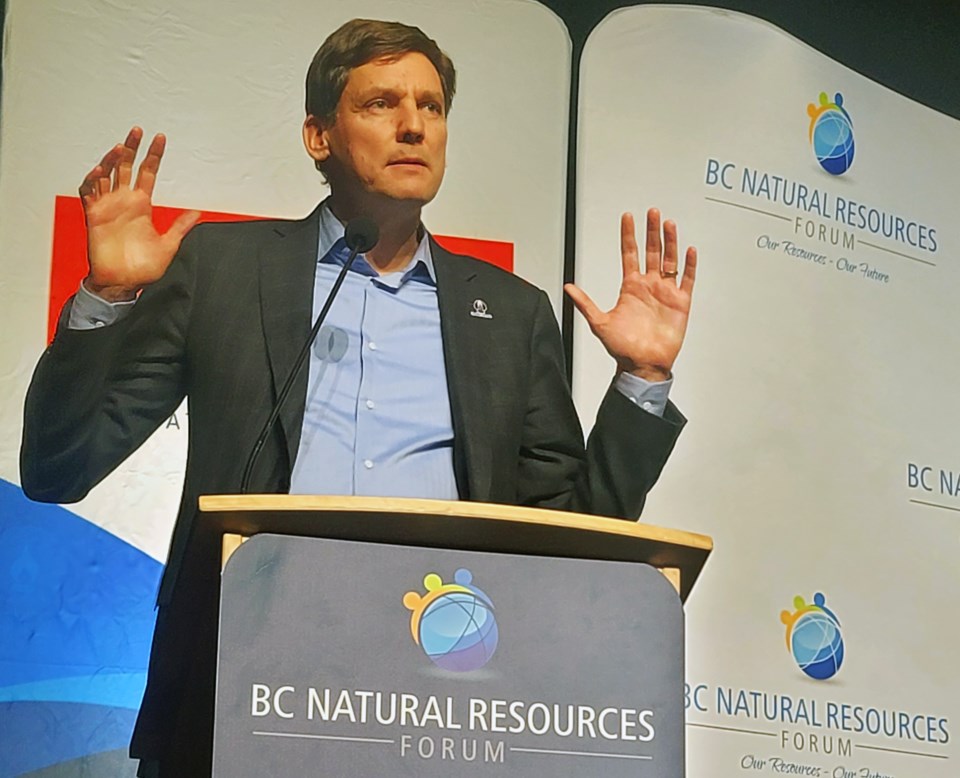Fuelled by increasing demand for electricity to power clean energy projects and grow the economy, BC Hydro intends to amp up construction of community and regional infrastructure projects that will result in close to $36 billion of investment over the next 10 years.
Premier David Eby made the announcement Tuesday evening at the BC Natural Resources Forum at the Prince George Civic and Conference Centre, citing the need to deliver clean and affordable electricity for British Columbians.
Eby said the updated BC Hydro capital plan spending will dwarf the previous $24 billion plan, with $10 billion set aside for electrification and emissions-free infrastructure projects – a tenfold increase.
New construction on those hydro projects is expected to spark a labour-force growth spurt that will result in between 10,500 and 12,500 jobs annually.
Population growth, new housing construction and more consumers and businesses switching away from fossil fuels are driving BC Hydro’s investment plan.
Among the new projects is a plan to twin the 500,000-volt hydro transmission line from Prince George to Terrace, announced a year ago by BC Hydro president/CEO Chris O’Riley at the Natural Resources Forum. An upgrade to install three capacitor stations to add 500 megawatts and boost capacity by 60 per cent is already underway.
Hydro will also upgrade B.C’s dams and generating facilities to make them safer and more reliable and energy efficient.
“Through BC Hydro’s 3,000-megawatt call for power we will help streamline the process,” said Eby, who told the crowd of about 900 about a new one-window application and approval process to free up electricity faster for in-demand industries.
Demand for power is expected to spike by 15 per cent over the next six years.
Despite low river levels and an extended drought, Eby said BC Hydro was able to send electricity to grids in Alberta and Washington state which were depleted by high demand during the extended cold snap of the past week.
He also said BC Hydro has applied for a rate increase that’s below the rate of inflation for a sixth consecutive year, making hydro more affordable for consumers.
As for the forest sector, Eby said he has met with industry leaders whose companies continue to struggle with the effects of beetle kills and wildfires that have diminished fibre supplies and he said he is listening to their demands for increased tenure rights.
He introduced Andrew Mercier as the new Minister of State for Sustainable Forestry Innovation and promised Mercier will be working with forest companies of all sizes to increase their access to timber.
“He’s going to be focused on delivering practical solutions to the challenges you’re facing on the ground,” Eby said.
The premier also announced an interim agreement between the Carrier Sekani First Nations and the Ministry of Forests with BC Timber Sales that includes 460,000 cubic metres of fibre in the Prince George Timber Supply Area.
“With this agreement, we will ensure that the Carrier Sekani people benefit more equally from the forest economy and show, once again, that partnerships are key to achieving a more stable supply of fibre in our province,” said Eby.
“At the same time, we are looking at ways to create more value-added wood manufacturing. The BC Manufacturing Jobs Fund does just that.”
Eby pointed to a stable mining sector that has attracted more than $15 billion in mineral investment in the seven years since the NDP formed the government.
Clean-energy operations that use electricity over fossil fuels to extract minerals will help those mines avoid European Union tariffs on high-carbon imports which he said are also being contemplated in the U.S.
While acknowledging permitting continues to a primary concern in natural resource sectors, he said there has been progress made, citing a 52 per cent reduction in the backlog of regional mine permits and a shortened processing time for waterway protection permits with 90 per cent processed within 30 days instead or nine-12 months.
“For too long, there’s been a misconception that a cleaner future is at odds with resource industries. That’s not true,” said Eby.
“In British Columbia, it’s resource workers who are helping to build the new clean energy economy. And some of our province’s most historic industries are the very ones making a brighter future possible.”



